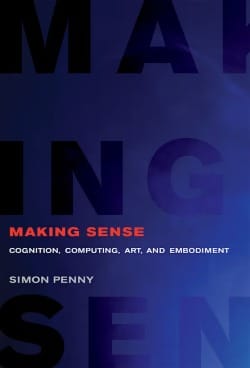Five Cool Reads: Independence Day Edition


Who is Simon Penny and how did he foretell our current AI hysteria?
My colleague Simon Penny knew about this confused and irrational "AI" hysteria moment better than anyone. In 2019. That's the year he published Making Sense of Cognition, Computing, and Embodiment
Because it's a holiday weekend, I don't want to bother the Knowledge Capital Index or wake up SXQD2 for their book recs. So I'm going to take the opportunity to plug Simon's book because it appears relevant to almost every conversation I have about "AI" these days. And it seems an appropriate time, Independence Day weekend, to celebrate the insight of an independent thinker like Simon Penny.
Where can I find your review of his book?
I decided today to reprint my original review on Knowledge Capital. Note that I wrote a review of this book originally, pre-pandemic, in 2019 the year that Simon published this book. It's fun to return to it to understand how much he foresaw. In the review, I mention the hype around social data analysis at that time and how the limitation of Boolean operants in gaining true insight on social data was risible. At the time I was researching qualitative data management and modeling intelligent querying of qualitative data as an improved way to handle non-quantitative insights for business intelligence. I was placing bets on NLP as being a key player in that. Funny, what has happened since.
I was blissfully unaware of what OAI was doing. I was aware of their existence but I did not think much of the pipe dream of "Generalized Artificial Intelligence" and never guessed they would pull a Zillow on the whole internet. I was working with very small data sets (and still do; I think that's what most people will do going forwards--STLMs are promising).
Why is Simon Penny such an important thinker for our time?
Every once in awhile I see a need to promote Simon's book again because he is the kind of hybrid unicorn the world should make into regular horses. He is only a unicorn because the system refuses to adapt to the consilience today's world demands. Despite this maladaptation, Penny succeeds where few dare to tread and rarely survive trying. Only a few of us have the energy or grit to fight institutionalized maladaptation, as it does not benefit any individual to fight the territorialism of disciplinarity. The unwillingness of the dominant fields to release fiefdoms and false authority in favor of greater relevance and insight has sharp edges and they cut. Nevertheless, as my forthcoming book Singular XQ argues, we are living in an age of convergence, where change is slowing down, despite us being told its moving faster than ever. Simon understands this better than most people--as such he does not silo and does not stay firmly within his disciplinary lanes. Not everyone does this well without becoming a dilettante but Simon succeeds in create soaring insights about the nature of embodied beings living in a computationally obsessed world.
Why are you writing an additional post about Simon Penny's Making Sense?
I'm writing this secondary post because something else came up as I searched for my old review of Simon's book. And it reminds me of something that tends to make me a little sad at moments, because I am a techno-optimist who believes that things are not good right now but will eventually get better because ultimately, digital technology will advanced humanity and support human flourishing. However, I have my moments where I think perhaps I was just a sucker all along. I was really proud when Leonardo at MIT picked up my book review as I was a dedicated reader of that magazine then. When I shared the review with Axel Coustere 🕹️I learned Leonardo had been bought out by Arizona State (which is also an interesting thing...have you been watching Arizona State? Unusual things are happening there and I am not sure what I think about it.) I'm not linking to it because it is really outrageous the way content creators have continued to be exploited in Big Tech.
I wish content sites considered the authors they feature and benefit from as human stakeholders in their product. Sadly, I have contributed to many digital sites because I believed in digital media, and it has benefitted many people, organizations, and businesses but not myself, including the Boston Globe, the now defunct Soul Pancake, and countless online academic journals. It would have been nice to even be notified that now Arizona State owns my writing. As humble and modest a contribution as it is, it still cost me energy and time, the greatest capital the 99% have. So I thought I'd right about that here and also connect my original review while promoting Simon's admirable work.
Are you still a techno-optimist about digital publishing?
The internet has acted to devalue writing and higher education and the fraudulent plagiarism, formulaic content, and soulless material of LLMs is the rock bottom of that process. I started writing on the internet in 1997. At the time, contributing for free seemed pioneering and exciting. Many of my friends in traditional journalism excoriated me for joining "the pajamas media," and believed I was essentially joining the world's biggest vanity press. (All of those colleagues, by the way, now write online for reduced rates at big name journalism outlets and do not support themselves with that work.) I believed that over time the publishing and university system would adapt. They are adapting--but not in the direction of valuing the humans that produce content, so far. Like others, I hold out hope for a grand redress and corrective action on this.
I even made my dissertation open source in 2010, to much chiding and criticism from my faculty. I believed that all scholarship could and would be open source. As a first generation college student, I received a lot of state funding to earn my bachelors, MA, and PhD. We all do. Even if we pay full tuition and receive no financial aid, none of our universities could survive without public funds. I believed that I owed my work to the public. More than one company has repackaged and sold my dissertation as a bound book on Amazon for a very high price tag and now, of course, it has trained untold numbers of LLMs. And I never received a dime.
Despite the gut punch of this moment for me and people like me who believed as Clay Shirky did, that the unregulated public facing internet was literally built on love, I am still a techno-optimist. The pain of this moment is part of the process of change—in the US we are finding ourselves once again having to recommit to the public facing institutions that made us who we are, a free press that serves the public, public broadcasting, a public library system, and a higher education system that once made us the envy of the globe. The price of a voting, representative republic is the task of keeping that public informed, free-thinking, and educated. The founders of the United States knew this and were united on this idea. You can find quotes from Hamilton, Washington, Jefferson, Adams, Franklin, and all of the founders to support this idea, but I'm going to go with on this Independence Day weekend, James Madison who wrote:
"A popular Government, without popular information, or the means of acquiring it, is but a Prologue to a Farce or a Tragedy; or, perhaps both."
Think something free and independent today--and support public facing institutions in the ways you know how, so that we can afford the price of freedom which has been and always will be education and information.
Stay INDEPENDENTLY Curious,
JP
Singular XQ endeavors to be a nonprofit public facing education, research, and development incubator for emerging technology. We meet our mission through content, rigorous support and educational opportunities for those with barriers to employment in technology, research, development, and consulting. You can support us by singing up for our podcast Patreon or by upgrading to a paid subscription here.




